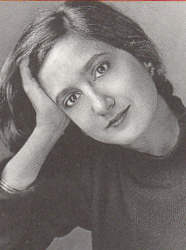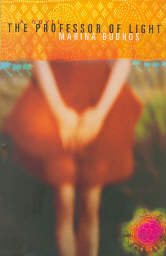As a child, I listened and tried to decipher adult conversation, but none of my school-bought
learning seemed to be much help to me as I grasped for meaning from the blur of words and
metaphor. When at twelve Mrs. Casey, my newspaper distributor, took me for a rare ride in her car
on my paper route, I was very puzzled when she said, "I've got a bone to pick with you." I literally
was expecting she was going to share her fried chicken lunch with me.
[page 75] Drinks were poured again and the conversation churned on. The room
filled with a yellow warmth, the men's voices swirls and eddies that I wanted to
swim inside. I grew dizzy trying to follow what was being said. Every time
someone asserted something, it was loudly and vehemently contradicted by
someone else. I had the felling some kind of joke was being made among them.
But not matter how hard I listened, I couldn't get it. I longed to run across the
room, lean into the round of my father's stomach, join him while he traveled into
the memories of Guyana.
When her Aunt Didi got enamored of an absent young boy and his love songs, she would take
to wandering. The solution they arrived at was to plant some eggs each time Didi got a certain look
of longing in her eyes. Like trees and seeds, chickens and eggs have their secrets that one can only
see rightly with the heart.
[page 100] "They bring her home, and the next day she slips away again. They find her
hours later feeding a little goat by the schoolhouse. Once more she wanders far
and wide. This time, the minister brings her back by automobile a good day
later. Her feet were all blistered, her hair fallen loose."
"Where did she go?" I asked.
Aunt Inez shook her head. "We don't know. But my mother get so upset
she pay a visit to the obeah woman, who tell her that each time Didi get that
look in her eyes, my mother got to bury an egg under the house steps. She bury
an egg for each wistful move Didi makes. If Didi stand on the verandah looking
with sad eyes at the coconut palm, my mother done bury her egg. At first Didi
keep wandering. Each time my mother bury another egg under a different step.
Didi's circle get smaller, until soon she keeps circling her own house."
Her father had his own equivalent of burying eggs, only he used notecards filled with ideas,
assertions, and injunctions.
[page 103] Flip-flap, the cards went as he set them down on the desk. Every
night I heard his heavy, sleepless tread as he circled around and around. Our
senses trick us. Reality is a vapor that drifts before our eyes. We are trapped in
bodies that can't help us find the truth. Don't trust what you feel with that skin of
yours. Don't stray too far. Don't leave me. He was planting his cards outside my
bedroom door, trying to draw the circuit of my thoughts tighter, to him.
Meggie's life was like a single photon spreading out through four slits in a screen, each one
corresponding to one of the nationalities which comprised her life. Like that photon, she might at any
one time appear directly behind one of the four slits.
[page 131] By now I'd come to see that my father's search into light grew more
intense in the summer because of who we were — a funny, in-between family,
Indian, Carribean, American, English — was clearer during the months we
spent in Sudbury. My father's book was both a wish to understand us and an
inquiry into particle and wave. And why not? Weren't we particle and wave, the
stream of old stories passing through?
When things got stagnant in Uncle Tom's house in Sudbury, he was the last one you'd expect
to take the initiative to pull them out of the sullen lethargy of sameness. And yet he did. He rented a
house on Brighton Beach, he learned to drive a car, he got his license, he bought a car, and he
showed up to announce these incredible events after the fact. He dragged Meggie and her philosophy
pop into the car and forced them to endure a drive round the block over and over again. "Enough,"
her father complained, but Tom kept to his tight circles over and again.
[page 135] As the car turned the corner yet another time, I understood this was
my uncle's way of keeping us tight to his rein. Around and around we went, like
my uncle's routines, wash one shirt every morning, water the plants every other
day, rubbish on Thursday nights. Once more we circled the familiar Sudbury
streets, my father cursing under his breath. Uncle Tom was determined to cure
the family of its ills; he pulled us in through these small, determined gestures, so
we wouldn't go wandering off.
Tom was like that, small gestures which moved the orchestra of the family, or maybe just the
piccolo of Meggie, into action at the right time to maintain the harmony of the musical score of life.
Like when Meggie stayed inside the summer after being assaulted by Peter who rubbed poison oak
upon her nude belly and breasts. Tom asked why she was staying inside.
[page 140] "I'm busy. I'm helping my father."
"Nonsense. Last summer you were always playing outside doing things,
like with that boy, Peter."
Even now, a year later, I could feel the crumbly calamine on my arms and
cheeks, the shame that burned my skin.
"He's not a bad boy," my uncle added. "Truly."
I waited for him to say something more. He didn't. He patted the earth
and shifted to another rosebush. That's the way my uncle was. He let drop a few,
short dry phrases, as if hoping the meaning would slowly rise, moist with
emotion. Half the time I didn't even know what he was saying, but a faint vapor
of love seemed to cling to me. He was a good man, as my aunt said.
One of her Caribbean cousins, Maywa, pins the name on her father.
[page 144] Maywa gently slapped my father on the arm. "Warren here, man,
he's goin' somewhere! He's a professor at some high-up place in America. You
should listen to him, man, all the things he's writing about, light and physics, it's
so deep I can hardly keep track. He's a professor of light!"
When her father begins writing again, working on his book about light after a long hiatus,
Meggie exults.
[page 150] Then a familiar sound: scratch, scratch, my father's favorite pen on
notecards, the cursive strokes flowing across the line. He was writing! I exulted.
Snap! he turned the card. That night, I dreamed of flaming words riding the
inky Brighton waves.
Nonsense is the sameness of the world which the true artist destroys while everyone else
believes that the sameness is "just the way the world is supposed to be." This is why no works by a
new artist ever appears in a museum. Museums are shelters of sameness. Meggie's father knew this.
[page 153] My father had always said that the beauty of real genius, real insight,
lay in not being afraid to stare into the clamor of nonsense. I thought of the sun's
rays bouncing off the white-hot pebbles, our adda nights, the octopus ride's
whirl through the air. . . . The light of the self always transmutes. Electrons like
people on the jihad(1), crammed together on the boats, scattering.
She conjures up for us an imaginary trunk of Albert Einstein's, full of the mind-bending ideas
of quantum physics.
[page 164] Inside this trunk Schrödinger's famous cat crouches, whirling through
a midnight-blue firmament. Unseen to anyone, a random event — the radioactive
decay of an atom — may set off a gas that kills the cat. We keep spinning through
time and space, never knowing whether the event occurred. At any given moment,
different versions of the cat exist in the universe, both dead and alive.
A man might be a thousand men. Each line creasing his palm, every seed he
plants in a cane field, every story he tells holds a different vision of what he might
be. Atoms burn electric, arrange themselves into flowering combinations. The sky
is gorgeous with color, one story blooms another, like the blue-skinned Shiva
branching into a thousand avatars.
In the end, the novel concludes in a beautiful metaphor of her father playing the philosopher
king who is always doing something. Below is a brief extract which she fills out so beautifully that I
cannot bear to quote its entirety less I rob you, dear Reader, the chance to experience it fully yourself.
It is a magical kingdom that I cannot enter. It is the kingdom of your generation, a kingdom I can
only shower embers into from the whirling whetstone of my writing bench . . .
[page 197, 200] The philosopher king is always leaving. . . . The philosopher king is always
walking. . . . The philosopher king is always sitting on his bench. . . . After many years, the
philosopher king grows very discouraged. He flings the stars angrily into the dark. . . . To his
amazement, the bits of broken stars fall into a dazzling pattern. A head, two arms, two legs. Before
him appears a vision of a girl. First she flows like water around his eyes. Then she turns solid, clear
and sharp as ice. Her eyes shine, black and determined as his. She has a stubborn chin, like his
sister's. . . .
She holds her arms out. "Come, Father. I can help you find what you're looking for."
"I can't. I'm a failure."
"That's not true. Remember Yagnavalkya in the Upanishads. For every question you ask, I
will build a wheel and another wheel, and finally we will have a chariot to take us to find the light."
. . . As the girl gives her answer, a chariot springs up around them. Its dashboard flashes, its seats
are made of Naugahyde, its silver wheel hubs dance with sparks. . . . They ascend into the sky. . . .
The girl is so proud she doesn't notice time lurch forward. The philosopher king starts to age. His
hair turns gray, his muscles sag. The surer the girl's course, the more he sinks into a shadow. The
chariot picks up speed, tipping from side to side, and the sun grows too hot. The philosopher king
feels his head will burst into flames.
"Please, stop! I can't bear it any longer!" He jumps from the chariot, bleeding a tail of
embers.
Terrified, the girl brakes to a halt. At first she is heartbroken, left alone in her empty chariot,
the philosopher king disappeared into the cold night sky. Then, to her amazement, she sees he isn't
really gone. His spirit lights up the entire sky, the land below, the rivers and seas and airports and
movie theaters, illuminating a kingdom that is now hers to enter.





